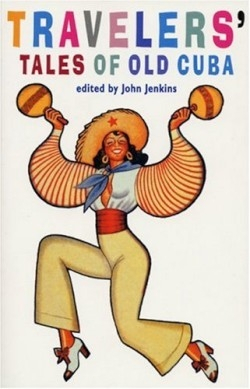Travelers' Tales of Old Cuba
From Treasure Island to Mafia Den
“Poverty stands fully revealed, naked, a striking,
repulsive sight to a stranger until all feeling of condemnation melts into an all-absorbing compassion,“ wrote Ana’s Nin while visiting Cuba in 1922. Deeply attuned to many of the same conundrums that fascinated other writers in Cuba before and since, her journals are filled with admiration and affection for this island culture, and at the same time, disgust for and ignorance of the Cuban people and their ways.
Nin’s intrigues and vexations are shared by others among the eighteen authors represented here. Creating both a literary project and an historical mini-course on the early nineteenth to middle twentieth century, the editor has gathered writings mostly by Americans in Cuba who have tended to have a “complex love/hate relationship” with the place. All are at least somewhat calculating in their approach, as though drawing near an unknown swamp. In the end, most also reveal their fondness for Cuba.
One of the more compelling selections is “Cuban Color Lines,” written in 1930 by Langston Hughes. He describes his arrest after attempting to swim on an American-owned hotel beach: “But there are definite social divisions based on colorÃ’and the darker a man is, the richer and more celebrated he has to be to crash those divisions.”
The renowned naturalist and wanderer John Muir gives details of passage to Cuba on a schooner loaded with lumber. In poetic, careful prose, he reflects on the fact that while humans were doing their best to colonize the island with homes and towns, the wild still prevailed. “But the armed and united plants of the tropics hold their rightful kingdom plantfully, nor, since the first appearance of Lord Man, have they ever suffered defeat.”
Also of interest are the field notes and descriptions of work and commerce on sugar cane plantations, as well as details of the slave trade.
The editor, an Australian, has also written two books on contemporary music and several books of poetry, and has contributed widely to newspapers and magazines. A modern reader will find many of his selections to be startlingly racist and sexist. The publisher even offers a disclaimer to absolve itself of culpability. Uncomfortable as this is, those with a committed interest in the region will be grateful that this book takes them beyond dissertations on Che Guevara and Fidel Castro.
Reviewed by
Holly Wren Spaulding
Disclosure: This article is not an endorsement, but a review. The publisher of this book provided free copies of the book to have their book reviewed by a professional reviewer. No fee was paid by the publisher for this review. Foreword Reviews only recommends books that we love. Foreword Magazine, Inc. is disclosing this in accordance with the Federal Trade Commission’s 16 CFR, Part 255.

